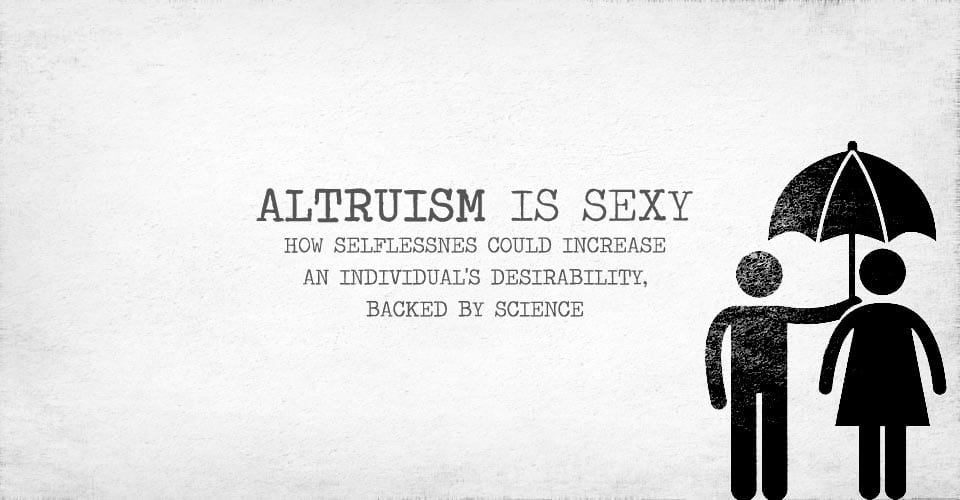Altruism Is Sexy How Selflessnes Could Increase an Individual’s Desirability, Backed By Science

Altruism can be defined as acting selflessly towards our fellow humans for the greater good. And yes, science says it’s sexy.
In an age that is supposedly overrun by Darwin’s survival of the fittest, a few acts of kindness can shift the balance for the greater good.
A perfect example of altruism happened in a subway, in New York, on January 2, 2007, when a man named Wesley Autrey heroically saved a man from certain death.
This almost horrific incident occurred when Cameron Hollopeter, a 20 year-old film student, suffered a seizure on the platform. Autrey, who was nearby, assisted Hollopeter by using a pen to keep his jaw open. Following the seizure he stumbled off the platform and onto the tracks. As he lay there, Autrey, seeing the lights of the oncoming train, dove off the platform in an attempt to lift him back up.
There was no time for this, so he threw himself over Hollopeter’s body in a drainage trench. Amazingly, all five cars passed over both parties, and neither one was injured.
Autrey was asked why he did such a thing, and responded to The New York Times by saying, “I don’t feel like I did something spectacular; I just saw someone who needed help, and I did what I felt was right.”
Why does altruism make people happy?
No one understands the link between altruism and happiness better than ex bio-chemist turned Buddhist monk, Matthieu Ricard.
His time is devoted to humanitarian projects in India, Nepal and Tibet, and he has worked tirelessly for decades to help alleviate pain and suffering in the world.
He quotes Alexander Jollien in his book, Happiness: A Guide to Developing Life’s Most Important Skill:
“Altruism is like rings in the water when you toss a pebble. At first they are very small, then they get larger, and finally they embrace the entire surface of the ocean.” He goes on to say: “Altruism and compassion have the aim of spreading themselves as widely as possible. We must simply understand that our own well-being and the world’s cannot rest on indifference to the happiness of the other or on a refusal to care about the sufferings around us.”
When we show the world our truest form of selflessness and kindness, altruism arises.
In his 2004 TED Talk, The Habits of Happiness, Ricard says:
“Everyone knows deep within that an act of selfless generosity, if from the distance, without anyone knowing anything about it, we could save a child’s life, make someone happy. We don’t need the recognition. We don’t need any gratitude. Just the mere fact of doing that fills such a sense of adequation with our deep nature. And we would like to be like that all the time.”
Altruism and attractiveness
The British Journal of Psychology has recently published research based on studies that have been conducted on approximately 800 participants, in which a team collected data with regard to their relationships and their tendencies to help others like donating to charity, helping classmates, helping the elderly cross the street, donating blood, etc.
The results were adjusted according to age and personality and “altruists were found to have greater success at dating and sex.” However, “it’s a more effective signal for men than for women. The study found that while altruism is a desirable quality among both genders, it affects men’s lifetime dating and sex partners more than women’s,” says Pat Barclay a University of Guelph Psychology professor.
But this isn’t new news, according to lead researcher of three studies of more than 1000 people, Dr. Tim Phillips, who states:
“For many years the standard explanation for altruistic behavior towards non-relatives has been based on reciprocity and reputation — a version of ‘you scratch my back and I’ll scratch yours’. I believe we need to look elsewhere to understand the roots of human altruism. The expansion of the human brain would have greatly increased the cost of raising children so it would have been important for our ancestors to choose mates both willing and able to be good, long-term parents. Displays of altruism could well have provided accurate clues to this and genes linked to altruism would have been favored as a result.”
He goes on to conclude, “Sexual selection could well come to be seen as exerting a major influence on what made humans human.”
It looks like our “goodness” is what has kept us alive as a species for so long. Let’s hope that continues.
By Raven Fon

